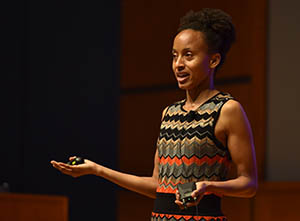Annual MBA diversity conference focuses on Gender Dynamics
Published: October 23, 2014 / Author: Christine Cox
With a theme of Gender Dynamics in the Business Environment, the eighth annual Notre Dame MBA Diversity in Business Conference at the Mendoza College of Business explored ways to create more inclusive business communities, especially through recognizing and addressing barriers to optimal participation by women.

Charlice Hurst
Roger D. Huang, the Martin J. Gillen Dean of the Mendoza College of Business, appreciated the focus of the conference and said examining and adjusting organizational attitudes toward women is important not just for women individually and collectively, but for businesses. “The dearth of female corporate leadership is a significant disadvantage to the business world,” he said, citing a Catalyst study that showed businesses in which women held leadership roles saw higher returns on equity, sales and capital.
“The main point is clear: Women are good for business,” he said. “As an institution of higher learning, our charge is to support diversity efforts that seek to make real inroads into helping women rise in leadership, and to help companies understand the value of a diversified workforce.”
The Oct. 3 event brought together women panelists and presenters who hold executive posts in top corporations. Among them were Notre Dame alumnae Julie Newhouse Goldman ’87, senior director of global brand strategy for Wrigley Co.; Christina Glorioso ’95, MBA ’99 senior vice president of client solutions for NBC News; and Joann Chavez ’86, LAW ’90, vice president and chief tax officer for DTE Energy, who delivered the lunchtime address.
The conference included a case competition sponsored by Ernst & Young that focused on expanding diversity through recruiting. Of the 11 teams that entered, a team from the University of Wisconsin–Madison claimed the top prize of $7,000. A Mendoza team of two-year MBA students earned the second prize of $3,000. Members were Josh Rabinovitz, Luke Smith, Phil Stout and Jessica Xu, all Class of 2015. Another two-year MBA team from Mendoza took third place, though no prize was awarded. Team members were Mona Abolgar, Diana Mo, Beth Owens and Katie Sekardi, all Class of 2015.
“Our focus of Gender Dynamics in the Business Environment encompasses so many different elements of workplace culture,” said Danielle Silva, an MBA student who led the planning committee for the conference. “Our team wanted a day to encourage discussion around the topic of gender diversity—to have conversations that address the current behaviors experienced and observed in workplace culture today. We wanted the conference to explore not only what is, but also what could be and how.”
Keynote speaker Charlice Hurst, an assistant professor of management at Mendoza, researches interpersonal dynamics in the workplace with a specific focus on gender. Her address, “Competitive Men, Catty Women: How We Think, Talk About, and Live Gender in Relationships at Work,” examined how deep, pervasive and unchallenged stereotypes of women can be in the workplace. Hurst also spoke about the implications of that view that women inherently have problems at work, especially when it comes to getting along with other women.
“I’m very uncomfortable with this meme in our culture that says women can’t work well together,” Hurst told an audience of about 40 in Mendoza’s Jordan Auditorium. “The implications are troubling … For one thing, it can lead to self-fulfilling prophecies in that women expect to be mistreated by other women and, as a result, treat other women with distrust or hostility. Another problem is that, if people think women can’t work well together, how willing will they be to hire multiple women or to place important work in the hands of teams with multiple women on them?”
Further, quantitative evidence hasn’t shown that these problematic relationships are intrinsic to women’s work experiences. Neither has it shown that women’s experiences are dissimilar to men’s. Yet, the prevailing belief has led to myriad self-help books. Hurst questioned research claims behind them, pointing out the prevalence of biased and incomplete sampling instead of quantitative, statistical information. “If you only ask for examples that confirm your hypothesis, then there’s no way of testing whether your hypothesis is actually true,” she stressed.
Hurst’s recent research with Mendoza management Professor Tim Judge revealed the same characteristics that help men receive higher wages do not result in as steep a wage bump for women. In measuring agreeableness—the tendency to be cooperative, altruistic and caring—Hurst and Judge found that men who are low in agreeableness earn significantly higher salaries than agreeable men. But while women who are disagreeable receive higher salaries than agreeable women, the salary increase isn’t nearly as significant as with men. “Displaying the behaviors that have been traditionally necessary for success in the corporate world is not advantageous for women, in general, and this idea that women are catty and can’t get along, especially with other women, may contribute to that disadvantage,” she said.
So what’s to be done?
First, Hurst emphasized everyone needs to stop making generalizations. And this includes researchers. “We have research on women’s relationships, but not men’s,” Hurst said. “We can’t reach strong conclusions about anything without looking at both.”
Second, the term “gender” needs to apply to both sexes equally instead of implying, and thus implicating, women.
Third, organizations need to examine their cultures. “What signals are [organizations] sending?” Hurst asked. “Are the promotion systems fair? In what subtle ways might the culture be reinforcing the very pattern that we are seeking to change?”
Along with Silva, the conference was organized by Mendoza MBA students Cory Albertson, Marjorie Betubiza, Erik Maag and Roger Smedley.




